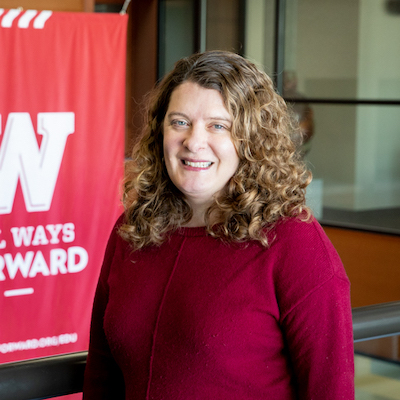Researchers Release Free, At-Home Early Math Resources for Families
May 18, 2020

Amy Claessens
From UW-Madison School of Education
A team of early math education experts from across the country has pooled its expertise to develop a set of free, research-based learn-at-home materials geared toward children from birth to age 8.
The “At-Home Early Math Learning Kit for Families,” created by the DREME Network’s Family Math team, is especially valuable as many people are staying home due to ongoing public health concerns related to the COVID-19 pandemic. The goal is to give families ideas that are fun, easy to implement, require no special materials, and can be folded into daily life — rather than feel like an extra task.
The DREME, or Development and Research in Early Math Education, Network was created in 2014 to advance the field of early mathematics research and improve young children’s opportunities to develop math skills. It includes a dozen scholars from across the country, including UW–Madison’s Amy Claessens, an associate professor with the Department of Educational Policy Studies and the Gulbrandsen Distinguished Chair in Early Childhood Education.
DREME Network members and affiliates collaborate to conduct basic and applied research, and develop innovative tools that address high-priority early math topics and inform and motivate other researchers, educators, policymakers and the public.
The quick-start kit of free early math resources is available for download in both English and Spanish.
“As a member of the Family Math team, I worked with other Network members and our affiliates (students and post-docs) to help create these materials for families,” says Claessens, an expert in early childhood education, child development, and public policy. “We all play a part in reviewing the materials and making sure that they are appropriate for young children and their families.”
The DREME Network website explains that the “At-Home Early Math Learning Kit for Families” includes:
• Tips for Reading: If you’re reading books with your children, it offers tips for bringing math into storybook time.
• Recipes: If you’re in the kitchen preparing food, the kit offers two easy recipes for cookies and personal pizzas, allowing families to start math conversations while cooking.
• Math Snacks: If you have just a few extra minutes as you go about your day, the kit offers brief ideas for uncovering and talking about math in everyday moments, like cleaning up toys or getting ready for bed.
• Card Games: If you have a deck of playing cards and 10-15 minutes, the kit offers directions for four card games that are fun and allow children to practice skills like adding and comparing numbers.
“We focused on creating simple activities that do not require a lot of materials so that math could be incorporated into daily life easily,” says Claessens, and who is the associate director of UW-Madison’s Center for Research on Early Childhood Education (CRECE). “Parents are under a lot of pressure with young children home from school and childcare, and we wanted to make math an easy and fun part of their days.”
Claessens notes that the DREME Network’s Family Math team plans to release additional math kits in the coming weeks. For updates, visit the DREME Network website.


